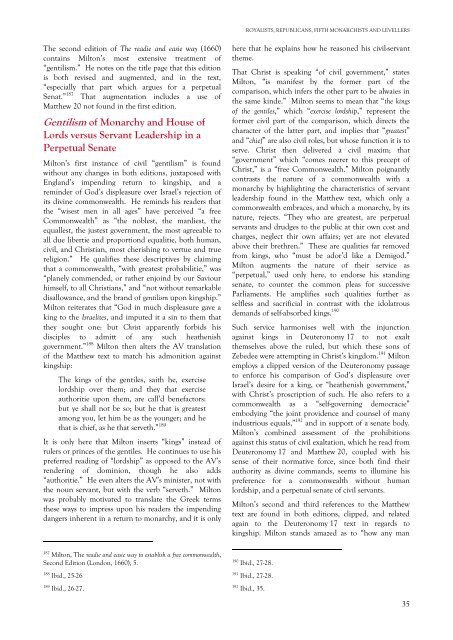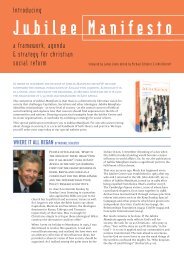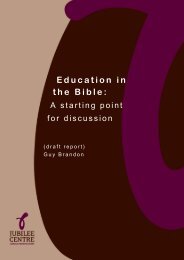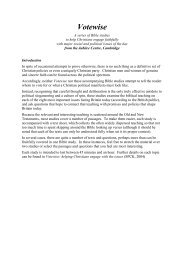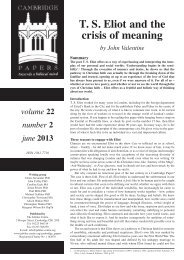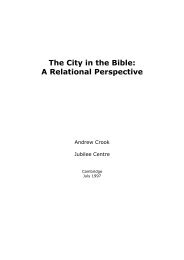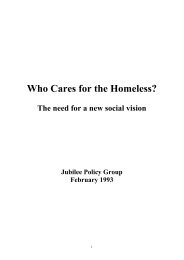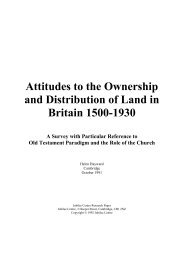Report Template - Jubilee Centre
Report Template - Jubilee Centre
Report Template - Jubilee Centre
Create successful ePaper yourself
Turn your PDF publications into a flip-book with our unique Google optimized e-Paper software.
ROYALISTS, REPUBLICANS, FIFTH MONARCHISTS AND LEVELLERS<br />
The second edition of The readie and easie way (1660)<br />
contains Milton’s most extensive treatment of<br />
“gentilism.” He notes on the title page that this edition<br />
is both revised and augmented, and in the text,<br />
“especially that part which argues for a perpetual<br />
Senat.” 187 That augmentation includes a use of<br />
Matthew 20 not found in the first edition.<br />
Gentilism of Monarchy and House of<br />
Lords versus Servant Leadership in a<br />
Perpetual Senate<br />
Milton’s first instance of civil “gentilism” is found<br />
without any changes in both editions, juxtaposed with<br />
England’s impending return to kingship, and a<br />
reminder of God’s displeasure over Israel’s rejection of<br />
its divine commonwealth. He reminds his readers that<br />
the “wisest men in all ages” have perceived “a free<br />
Commonwealth” as “the noblest, the manliest, the<br />
equallest, the justest government, the most agreeable to<br />
all due libertie and proportiond equalitie, both human,<br />
civil, and Christian, most cherishing to vertue and true<br />
religion.” He qualifies these descriptives by claiming<br />
that a commonwealth, “with greatest probabilitie,” was<br />
“planely commended, or rather enjoind by our Saviour<br />
himself, to all Christians,” and “not without remarkable<br />
disallowance, and the brand of gentilism upon kingship.”<br />
Milton reiterates that “God in much displeasure gave a<br />
king to the Israelites, and imputed it a sin to them that<br />
they sought one: but Christ apparently forbids his<br />
disciples to admitt of any such heathenish<br />
government.” 188 Milton then alters the AV translation<br />
of the Matthew text to match his admonition against<br />
kingship:<br />
The kings of the gentiles, saith he, exercise<br />
lordship over them; and they that exercise<br />
authoritie upon them, are call’d benefactors:<br />
but ye shall not be so; but he that is greatest<br />
among you, let him be as the younger; and he<br />
that is chief, as he that serveth.” 189<br />
It is only here that Milton inserts “kings” instead of<br />
rulers or princes of the gentiles. He continues to use his<br />
preferred reading of “lordship” as opposed to the AV’s<br />
rendering of dominion, though he also adds<br />
“authoritie.” He even alters the AV’s minister, not with<br />
the noun servant, but with the verb “serveth.” Milton<br />
was probably motivated to translate the Greek terms<br />
these ways to impress upon his readers the impending<br />
dangers inherent in a return to monarchy, and it is only<br />
here that he explains how he reasoned his civil-servant<br />
theme.<br />
That Christ is speaking “of civil government,” states<br />
Milton, “is manifest by the former part of the<br />
comparison, which infers the other part to be alwaies in<br />
the same kinde.” Milton seems to mean that “the kings<br />
of the gentiles,” which “exercise lordship,” represent the<br />
former civil part of the comparison, which directs the<br />
character of the latter part, and implies that “greatest”<br />
and “chief” are also civil roles, but whose function it is to<br />
serve. Christ then delivered a civil maxim; that<br />
“government” which “comes neerer to this precept of<br />
Christ,” is a “free Commonwealth.” Milton poignantly<br />
contrasts the nature of a commonwealth with a<br />
monarchy by highlighting the characteristics of servant<br />
leadership found in the Matthew text, which only a<br />
commonwealth embraces, and which a monarchy, by its<br />
nature, rejects. “They who are greatest, are perpetual<br />
servants and drudges to the public at thir own cost and<br />
charges, neglect thir own affairs; yet are not elevated<br />
above their brethren.” These are qualities far removed<br />
from kings, who “must be ador’d like a Demigod.”<br />
Milton augments the nature of their service as<br />
“perpetual,” used only here, to endorse his standing<br />
senate, to counter the common pleas for successive<br />
Parliaments. He amplifies such qualities further as<br />
selfless and sacrificial in contrast with the idolatrous<br />
demands of self-absorbed kings. 190<br />
Such service harmonises well with the injunction<br />
against kings in Deuteronomy 17 to not exalt<br />
themselves above the ruled, but which these sons of<br />
Zebedee were attempting in Christ’s kingdom. 191 Milton<br />
employs a clipped version of the Deuteronomy passage<br />
to enforce his comparison of God’s displeasure over<br />
Israel’s desire for a king, or “heathenish government,”<br />
with Christ’s proscription of such. He also refers to a<br />
commonwealth as a “self-governing democracie”<br />
embodying “the joint providence and counsel of many<br />
industrious equals,” 192 and in support of a senate body.<br />
Milton’s combined assessment of the prohibitions<br />
against this status of civil exaltation, which he read from<br />
Deuteronomy 17 and Matthew 20, coupled with his<br />
sense of their normative force, since both find their<br />
authority as divine commands, seems to illumine his<br />
preference for a commonwealth without human<br />
lordship, and a perpetual senate of civil servants.<br />
Milton’s second and third references to the Matthew<br />
text are found in both editions, clipped, and related<br />
again to the Deuteronomy 17 text in regards to<br />
kingship. Milton stands amazed as to “how any man<br />
187<br />
Milton, The readie and easie way to establish a free commonwealth,<br />
Second Edition (London, 1660), 5.<br />
188<br />
Ibid., 25-26<br />
189<br />
Ibid., 26-27.<br />
190<br />
Ibid., 27-28.<br />
191<br />
Ibid., 27-28.<br />
192<br />
Ibid., 35.<br />
35


